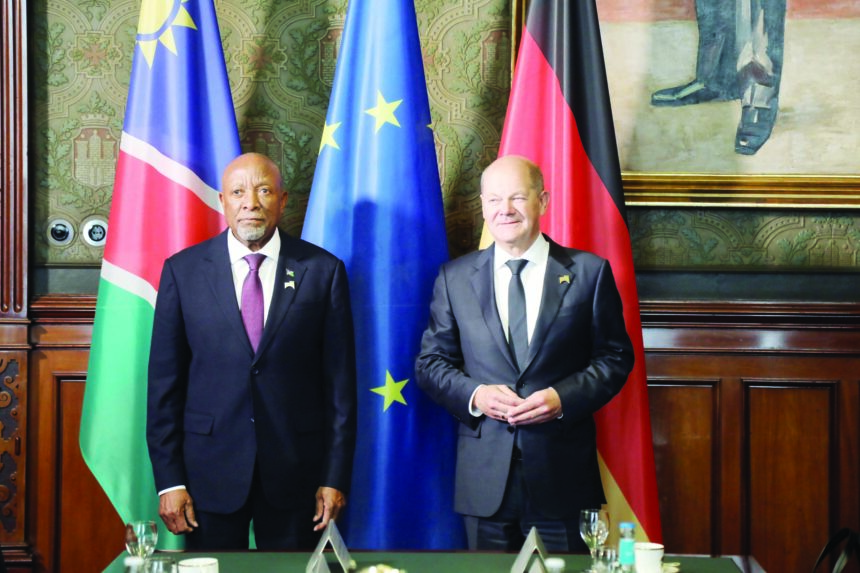President Nangolo Mbumba wants the marathon talks on genocide between Germany and Namibia concluded while ensuring that all outstanding concerns are addressed.
Mbumba made these remarks during a meeting with German Chancellor Olaf Scholz on the sidelines of the Hamburg Sustainability Conference, where both leaders held bilateral talks.
Through presidential spokesperson Alfredo Hengari, Mbumba conveyed to Scholz that Namibia and Germany share a painful past, highlighting the urgent need to address the genocide question in the interests of the affected Herero and Nama communities, as well as all Namibians.
“Namibia and Germany share a painful past, and there is a need to resolve the genocide question in the interests of the affected Herero and Nama communities in particular,” Mbumba emphasised.
The bilateral discussions covered several key issues in Namibia-Germany relations, including the Joint Declaration on Genocide, apology, and reparations, as well as Namibia’s ambitions to develop green industries and green hydrogen.
The genocide talks between the two governments have been ongoing since 2015.
During the bilateral talks, Mbumba reiterated the urgency of resolving the genocide question, emphasising its importance for the affected communities and Namibia as a whole.
The President underscored that the frequency of high-level meetings between them was a demonstration of trust and commitment on the part of Germany and Namibia to scale up mutually beneficial cooperation in several areas.
He also informed Scholz about Namibia’s ongoing efforts to combat the devastating drought affecting the country and its impact on agriculture and livelihoods.
Highlighting the excellent bilateral relations between Namibia and Germany, Mbumba expressed Namibia’s commitment to developing green industries and green hydrogen as part of its national economic growth strategy.
He also thanked Scholz for Germany’s shared commitment to promoting development and investments in Namibia’s green industries.
Presidents
Yesterday, Mbumba was also in Berlin for bilateral talks, at the invitation of German president Frank-Walter Steinmeier.
Earlier this year, Steinmeier acknowledged that it is high time for his country to take full responsibility and tender a formal apology to Namibians for the atrocities committed during the 1904/08 genocide.
Steinmeier made the remarks during the late president Hage Geingob’s memorial service.
Yesterday, the discussion seemingly continued with the same tone.
President Steinmeier requested the talks, which are a demonstration of the remarkable strides President Mbumba has made in advancing Namibia’s diplomatic footprint over the past nine months. The presidents will be meeting for the second time, of which the first was after the passing of Geingob. President Mbumba will re-emphasise the need to conclude the outstanding issues in the Genocide negotiations and reparations talks. The President will also talk about the need for Germany to continue supporting Namibia’s effort in developing green hydrogen and green technologies and industries,” Hengari said yesterday ahead of the meeting.
Genocide
The 1904/08 Ovaherero/Ovambanderu and Nama genocide was a campaign of ethnic extermination by the German colonial government. It was the first genocide of the 20th century and saw over 100 000 Ovaherero/Ovambanderu and 10 000 Namas perishing during the German onslaught, which sought to wipe the communities off the face of the earth. The phases of the genocide that followed thereafter were characterised by widespread death from starvation and dehydration due to the prevention of the Ovaherero/Ovambanderu and Namas from leaving the Kalahari Desert by German forces. Once defeated, thousands were imprisoned in concentration camps, where the majority died from diseases, abuse, and exhaustion.
More so, Cabinet earlier this year announced the proclamation of 28 May as the official national Genocide Remembrance Day.
It will be formally commemorated next year.
Many political parties and traditional leaders welcomed the proclaimed remembrance and agreed it will fundamentally change the attitude and dialogue of the Namibian government with its German counterparts at the negotiation table. At the moment, Germany has offered 1.1 billion Euros (or N$18 billion) for developmental projects in seven identified regions as reparations for genocide, which is a far cry from Namibia’s demand of N$1.1 trillion. The latter figure takes into account loss of life, dispossession of land, and displacement. Another issue that does not sit well with affected communities, the Namibian government, and opposition parties is that the proposed N$18 billion is to be paid over 30 years. Meanwhile, talks between the two governments have seemingly hit a stalemate.
Last year, the United Nations special rapporteurs criticised both Namibia and Germany for allegedly violating the rights of Ovaherero and Nama ethnic minorities by excluding them from talks over reparations for colonial crimes against their ancestors.
The UN representatives called on Germany to take full responsibility for all its colonial crimes in Namibia, including mass murder.



